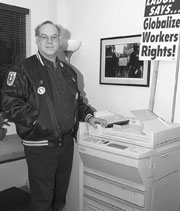“THIS IS CIVIL WAR,” says Teamster reformer David Reynolds. “That’s how I see it. And the battlefield is Local 763.” Reynolds posted a victory recently in his battle against the union’s old guard, represented locally by Jon Rabine, widely considered Washington’s most powerful Teamster. While Reynolds is pleased with the recent results, it’s clear this union war will be long and bloody.
Last December, Reynolds shocked the labor world by beating Rabine in the election to head up Washington’s largest Teamsters local, 763. Then, a few months later, regional Teamsters bosses tossed the election results out, ruling that Reynolds had violated campaign rules, and called for a new election. Now, in a victory for Reynolds, international Teamsters officials have halted the new election and threatened to investigate the alleged campaign violations themselves.
These back-and-forth skirmishes reflect a deeper struggle for control of the Teamsters, one of the nation’s most powerful labor organizations. The Teamsters have traditionally been plagued with a reputation for dirty deals, strong-arm tactics, and connections with underworld crime. The union was booted from the AFL-CIO from 1957 to 1987, while its infamous leader Jimmy Hoffa ran it from a jail cell in the late 1960s and early 1970s before “disappearing” permanently in 1975. Two other Teamster presidents, including Washington’s own labor heavy Dave Beck, also served time behind bars.
Reynolds is associated with the Teamsters for a Democratic Union, reformers who charge that “old guard union bosses” like Rabine pad their salaries, ignore their members, and exclude their bargaining teams from key negotiations. Still, the reformers have had their share of scandals. Ron Carey, a leading reformer, was elected Teamster president in 1992, but was then barred from running for re-election in 1998 and later indicted by the federal government for his role in embezzling union funds to replenish his re-election campaign.
Locally, Reynolds is facing much less dramatic campaign violation charges. Under Teamsters election rules, employers cannot contribute to the unions’ campaigns. Rabine charges that Reynolds violated that rule by accepting in-kind contributions of office rent and a copier from an employer.
On March 26, the Joint Council of Teamsters 28, Washington’s highest Teamster board, backed Rabine and voided the election. Oddly, Rabine presented no proof that an employer funded either the copier, which he paid a private detective to photograph through a window, or the office rent. In fact, the council admits in the report that there is “no evidence of who paid for the copier or how.” Still, the council says it “deduced” guilt, partially based on the fact that Reynolds failed to attend a crucial hearing and was uncooperative in the council’s investigation.
Reynolds has categorically denied the accusations of election violations. He says the copier cost nothing and was donated by a Teamster who supports reform platforms. But the donor was not available to confirm the arrangement.
As for the office space, Reynolds says his wife and campaign manager, Carla Kiiskila, and a friend had been sharing the NE Boat Street office since July for a variety of purposes. Half the rent was paid for by Kiiskila personally; that she chose to use her half of the office for running a campaign doesn’t break the rules, he says.
He admits, however, that he did not show up for the council’s second hearing on the matter. “I didn’t show up to the second hearing on principle,” says Reynolds. “They had no evidence, and they have no subpoena power. Rabine’s main witness was me.”
The Local 763 election is small in terms of number of votes—only 1,500 out of 4,400 members participated in the December election, with Reynolds winning by 92 votes—but the stakes are big. Rabine has been Washington’s most powerful Teamster for years, holding multiple positions and collecting multiple salaries. By losing as Secretary Treasurer of Local 763, he also lost a guaranteed place on the Joint Council, where until the December election he served as president. He held these two seats in conjunction with his current position as vice president on the national Teamsters board.
If and when a new election will be held is now questionable, however. On April 6, the International Brotherhood of Teamsters overruled the Joint Council’s call for a new election. If no resolution is reached locally, a spokesman for the IBT said that they will investigate the claims themselves. The spokesman wouldn’t comment further on the issue, however, referring calls to the Joint Council. The council and Rabine are apparently reluctant to discuss the issue publicly. Neither of them returned repeated phone calls from Seattle Weekly.
Reynolds says he isn’t worried, that even if the election is held again, he remains confident of victory. “The winds of change are blowing through the Teamsters,” he says. “And Rabine is trying, but he can’t stop them.”







